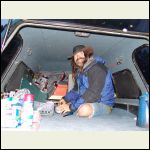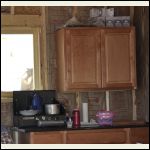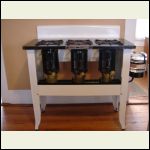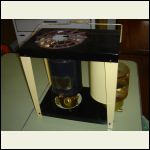| . 1 . 2 . >> |
| Author |
Message |
SeattleRain
|
# Posted: 7 May 2009 12:28am
Reply
Hi Everyone,
I absolutely love this site! So many great ideas! I've just purchased some land in the woods and am planning on building a 14x20 off-the-grid cabin for a weekend escape. I know I'm thinking way ahead of the game, but since I'll only be using the cabin occasionally can I get away with using a coleman-type two-burner propane camp stove for cooking inside the house? I've used these outside before, but is it safe to use it inside the cabin? I'm concerned about fumes, carbon monoxide, etc. What does everyone else use for cooking other than a woodstove. Thanks for your comments and ideas!
|
|
gmcgreg
Member
|
# Posted: 7 May 2009 01:23am
Reply
I've been using a two burner propane stove for cooking every day for over two years and My ears hav'nt fallen off yet. I would guess It is as clean as natural gas, but very explosive. Common sense is Your best freind
|
|
Vince P
Member
|
# Posted: 7 May 2009 02:23pm
Reply
It will give off carbon monoxide, so if your cooking area happens to be in a small enclosed space, then ventilate by opening doors or windows.
|
|
islandguy
Member
|
# Posted: 7 May 2009 03:31pm
Reply
Most of your cooking will be outdoors anyway. Consider using gelled alchhol for cooking indoors. Cheap, safe, lightweight, available anywhere, no fumes, no explosive gas. Downside is the heat output is quite low.
|
|
Cambodian Cook
|
# Posted: 27 May 2009 03:37am
Reply
Ha! I live and work in Cambodia. All we have, in every house across this country, is propane stoves... Huge tanks of the stuff right under the stove top in the kitchen. I been cooking like this for 6 years! No problems what-so-ever... When I return to build my cabin in Nor Cal, I will continue to cook the same way!
|
|
Vince P
Member
|
# Posted: 27 May 2009 08:56pm
Reply
Quoting: Cambodian Cook No problems what-so-ever...
I assumming that the houses in Cambodia don't need be airtight for winter...
|
|
Sparky
|
# Posted: 28 May 2009 04:07pm
Reply
I lived in a yurt in then a vintage truck camper in Alaska. Now I live in a ten by twelve shack in Wisconsin. All the room I'll ever need because I spend 99% of my time outdoor anyway. I do all my cooking on a two burner stove. No problems at all.
|
|
Anonymous
|
# Posted: 16 Nov 2009 04:47pm
Reply
Hi, now I am no expert, but my understanding, and what I heard from a good source on the news about measures taken during a power outage, is that if you use it for quick meals and making coffee in a relatively ventilated area, and you disconnect the propane tank and store it outside when not in use (like on your porch) you should not be too worried. The problems that have mainly arisen with indoor propane cooking are when some people brought in their Bar-b-q's to try to actually heat their houses with them during a major power outage, with all burners on high for hours! If you are going to use a camping stove indoors for cooking frequently, I recommend you get a battery operated carbon monoxide sensor/detector, just for an extra measure of safety. They are not too expensive, somewhere around $30.
|
|
|
elkdiebymybow
Member
|
# Posted: 12 Jan 2010 12:07am
Reply
No worries as long as you have some vetilation eg. not air tight. I hunt with a doc who uses a propane stove inside a small tent and when I had concerns about that he set my mind at ease.
|
|
lawnjocky
Member
|
# Posted: 27 Jan 2010 07:12pm
Reply
There are two issues, cmbustion byproducts and the explosive nature of propane. Always have a fresh air source and you won't have a problem.
Always, always shut off the valve on the tank, not just the stove. Besides saving the loss of the gas it reduces the risk of an explosion due to leaking stove valves.
I have been using propane on boats and in cabins for decades without a problem paying attentin to the above.
Jocko
|
|
bugs
Member
|
# Posted: 28 Jan 2010 11:07am - Edited by: bugs
Reply
This may be a dumb question...... Or maybe the dumb question is the one that is not asked. Hmmmm
I was thinking of putting a propane cook top into our shed. Such as this "drop in" two burner wedgewood model at http://www.ducktec.com/itm00087.html. I see them in RV's and cabins. So I was wondering what would be involved in connecting it to a typical barbecue 20 lb bulk propane tank?
At present I have a 10 foot Mr Heater endorsed hose running out the window from our buddy mr heater to the propane tank outside. I was thinking I could do the same for the stove top. Maybe use a branch line (with an appropriate regulator) so we would only need one tank and have both appliances ready to go when needed. We would leave a window cracked open as we need to do for the heater. And most of all it allow us to cook out of the elements.
Right now we just have a two burner Coleman camp stove which I would never use inside due to flare ups etc. With white gas/naphtha you never know what is going to happen sometimes.
Any thoughts/advice would be appreciated.
|
|
Used propane for years!
|
# Posted: 28 Jan 2010 02:50pm
Reply
As with any type of gas appliance common sense is the best...if you have more questions talk to a QUALIFIED GAS FITTER/INSTALLER they r the guys with ALL the know how and risks. A carbon monoxide detector is also as easy to use as a smoke dector! However you should make sure it is installed properly by a professional or your insurance might not cover you.
|
|
Moontreeranch
Member
|
# Posted: 29 Jan 2010 01:11pm - Edited by: Moontreeranch
Reply
Bugs...I been using my white gas 2 burner camp stove inside...for years...only in the cabin for a few months but I have used it in the back if the truck, and in my little cargo trailer. In the back of the truck the space is very small and in winter in warms it up nicely...keeping the window open a bit allows ventilation. The trick to flare ups is to know how to "read" your stove and be very familiar with its operation. The second most critical thing is to limit any combustibles that may be above it...In the cabin is is very easy.
stove in back of truck
| 
Stove at cabin with granite counter in
|  |  |
|
|
millstream
|
# Posted: 22 Jul 2011 12:39am
Reply
Most gas stoves can easily be converted to propane. I have an very old 50s 4 burner "propane" cooktop with an oven and a broiler plus a small storage section for pans. While repiping it due to copper theft over winter I had to use a "camp" stove that was convertible from gasoline to several other fuels, and the fumes were no joke. plus it required a lot of pumping to keep it working, plus turning a nozzle arm to keep it clean. Lets just say that before the sun was up and I was just trying to make coffee the experience left a bitter taste with me. I cook alot at the cabin, from crawdad boils to full out indian feasts. I can't imagine using that awful single burner to create something edible. (I know, I'm spoiled) but really I just wanted to voice a vote for the old gas stove/oven found on craigslist or a yard sale that was converted to provide everything you need, even being capable of cooking a thanksgiving turkey if that's your thing.
|
|
Montanan
Member
|
# Posted: 22 Jul 2011 10:26am
Reply
We use our 2 burner Coleman stove in the cabin all the time. I just make sure to open a door or window.
|
|
grinnil
|
# Posted: 22 Jul 2011 10:53am
Reply
wats the difference between a camp stove and a gas range?gas ranges are safe
|
|
MtnDon
Member
|
# Posted: 22 Jul 2011 06:16pm - Edited by: MtnDon
Reply
Camp stove runs at higher pressure than household gas range. That should not affect the end result IMO.
But, perhaps there is more danger from a campstove because the cylinder is in a closed room? Perhaps a camp stove may be more prone to producing CO?
|
|
Just
Member
|
# Posted: 22 Jul 2011 08:16pm
Reply
every camper sold today has a propane cook top can't see there being any differance as long as it is hooked up properly and you have some ventalation'.. not to heet the place though!!!
|
|
turkeyhunter
Member
|
# Posted: 22 Jul 2011 08:33pm
Reply

i like cooking with coleman fuel at my old camp last fall. :-)
never had any problems with ribeye fumes.
|
|
neb
Member
|
# Posted: 22 Jul 2011 11:21pm - Edited by: neb
Reply
Gas ranges are used through out this country everyday that run on propane. I'm not an expert but growing up that is all people had in this part of the world. I'm not sure that there is to much to worry about. I think of some of them and they lived into their 90's so don't think it hurt them. There was no windows open or doors open in these cold winter months Almost all these home heat with propane also but don't know if there was venting going on. These homes where older homes there was no tech. biult into them. I would always encourage safety first.
|
|
larryh
Member
|
# Posted: 24 Jul 2011 05:49pm - Edited by: larryh
Reply
Around here many people use full size new propane ranges. I have used kerosene two to five burner ranges all my life. But the coleman white gas stoves, which I have had a number of have a couple issues. One is that white gas puts off fumes that are deemed cancer causing by the government. Plus I have had both 30's colemans that were called "cabin stoves" which have three burners and a splash back on legs with a shelf, and several coleman hot plates which come in two and three burners. They work pretty well, but a leak or some sort of malfunction is very dangerous with explosive raw gasoline, I had a near miss one day after working on one and missed a connection. When I lit the stove thank goodness it was sitting on my wood range because when I opened the valve to light the main burners it threw white gas out the top and sides which ignited before I could even switch it off. It threw flames to the ceiling and burned gas on the stove top for almost a minute. Had it been on a table or counter it would have burned the house down probably. My real objection to them is the awful odor they produce when turned off for some reason. They tend to smell and burn your eyes when operating but when going out something happens and the smell is really offensive for a long time. My oil stoves may smell a bit like kerosene but I can handle that in comparison and much safer. Propane should be fine inside, but even those now say not to operate indoors. I am not exactly sure why except that maybe like some here the tendency to operate them in very small spaces could lead to carbon monoxide. Which on occasion has been deadly.
Boss three burner stove.
| 
Boss, very portable one burner.
|  |  |
|
|
Scott_T
Member
|
# Posted: 24 Jul 2011 09:09pm
Reply
Carbon monoxide is the biggest issue with using gas burners indoors. LOTS of ventilation is a must. NG/LP ranges which are common in homes have proper ventilation systems and safety features installed to prevent CO poisoning.
Over the years we had more than one experience where just the use of a fondue pot (alcohol burner) at home in winter (sealed house) frequently generated enough CO that our detectors would go off. Naptha fuelled stoves scare the bejesus out of me. Seen more than one spill go ablaze. My grand dad used one inside his cottage regularly and almost burned it down more than once. Propane stoves are safer. Everyone be careful.
|
|
suekiyaki
|
# Posted: 20 Sep 2011 03:00pm
Reply
dear Cambodian Cook: what kind of stoves are they in cambodia? I was just there and wished i could have bought one to take home with me! How can I buy one for the US? my kitchen needs one for canning.
|
|
Bigdtown
Member
|
# Posted: 8 Jan 2012 05:52pm - Edited by: Bigdtown
Reply
hello everyone. I just bought a two burner propane stove from Harbor Freight, but it has the hookup for a traditional regulator from a larger propane tank. The thing is I want to use those little coleman 16oz propane canisters on it...can anyone recommend a place where I can find a conversion piece to make this work? Here is a link to the stove I bought http://www.harborfreight.com/stainless-steel-3-way-lp-stove-with-grill-99861.html and you can see the hookup on the bottom right. Thanks for any help!
|
|
VC_fan
Member
|
# Posted: 8 Jan 2012 08:01pm
Reply
I use the Harbor Freight 2-burner model ($20-$30 when I bought it, plus the standard regulator). I have the 20-lb cylinder under the counter and turn it off when it's not in use. I don't do much but heat water and soup but have been very happy with it. This is in a 16x20 with an essentially open second story. Just use common sense and a good CO detector.
|
|
MtnDon
Member
|
# Posted: 8 Jan 2012 08:37pm - Edited by: MtnDon
Reply
I believe you still need the hose and regulator that would permit direct connection to a 20 lb or larger tank. There are two variations of the adapter that is used between the disposable cylinder and the regulator, one adapts to the old POL style only and the other is for the new Acme nut. The Acme nut version I have also has the POL threads.
POL style
ACME nut
Do a search, there are other vendors too, Walmart sells them where I am.
|
|
simon
|
# Posted: 9 Jan 2012 03:25am
Reply
I've always had a gas range.. With pilot lights that were always lit.. Never once had any issues.. I lived in air tight small places like mobile homes.. Had gas dryer, stove, water heater, and furnace.. No problems.. I don't see a small 2 burner causing a problem.
|
|
fletchworks
|
# Posted: 22 Jun 2012 10:39am
Reply
The real threat from propane is the fumes being a gaseous form that displaces oxygen by being heavier and totally unbreathable. If the flame goes out for any reason, while unattended, such as using for long simmering and a bad choice for heating, or the tank fill vent leaks, or your connections leak, or the tank over pressures, usually from overheating, and blows it's safety popoff valve, the gas will build up, or immediately fill a confined space, cooking or not, and push the breathable air up and out of a closed space. Suffocation is the peril. Tanks must be outside any structure, regulated with sufficient control, usually outside the dwelling and/or near the propane tank itself. The diaphram in the regulator can fail leaking fumes out of it's own screened vent port, so it needs to be completely outside the structure, or the fumes leaking can, also, be ignited by indoor flame sources, such as a pilot light from another appliance, a gas lantern, a smokers match, or lighter, or even the fire of the cooking stove being used at the time-BIG BOOM. Most 100 pound cylinders and bulk pigs are placed well away from a dwelling and in a zone of ease-in-handling-and-refilling convenience. The most critical thing in using any gas appliance is to leakcheck the connections-ALL OF THEM-every time the tank is disconnected and reconnected. Venting your confined space is small change as most dwellings and campers are not air tight. The secret is to vent the space below your breathing zone to allow the heavier gas to dissipate and not build up to inhibit oxygen intake. Warm a place up before going to bed and, then, turning the heating unit off is the best advice for any heat source that is questionable-that is, not an approved, or recommended device for indoor use. Carbon dioxide is absorbed 100 times faster than oxygen by your body and cannot recover after two regular breaths of the gas. You will be dead and not know it. Being ignorant, or denying yourself the reasoning to practice safe and smart use of propane indoors are the content of most bottled gas accidents with fatalities and extreme property damage. Home furnaces and water heaters are vented to the outside of structures with fire approved materials and construction techniques. Propane stoves for living spaces have gas control safety valves that will automatically shut off burner controls when valve problems occur-THEY DO NOT HAVE A VENT AND WILL NOT PREVENT YOU FROM DANGEROUS USE AND PRACTICES-only a faulty control valve. Diligence in propane use will keep you alive and safe better than ignoring facts and employing dangerous practices, that can not be well afforded. Live long and prosper.
|
|
cobblestones
|
# Posted: 22 Aug 2012 03:28pm
Reply
Hey, I'm in the dreaded "cone of destruction" for Hurricane Issac. I just bought a 2 burner stove that uses a 16oz propane tank to run. Is it safe to use indoors, just for heating food and not major cooking?
|
|
OwenChristensen
Member
|
# Posted: 23 Aug 2012 07:51am
Reply
It's very safe. That's why the small tanks. I you should rupture a tank , it's limited to just a small amout.
All this talk of ventilation makes me laugh. There's a lot of us that cook on expensive lp gas stoves every day. We just bought an LG convection oven and stove. LG sure doesn't have a warning to open a window when in use. Yeah, maybe if your in a fish house.
Owen
|
|
| . 1 . 2 . >> |

